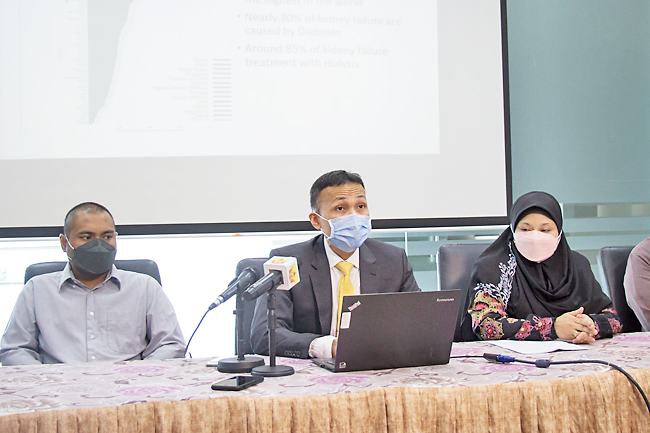Izah Azahari
With evidence showing that kidney transplant is a better alternative than dialysis treatment, the Ministry of Health (MoH) is pinning hopes that family members will be willing to step forward to donate a kidney.
A kidney transplant affords renal failure patients a better quality of life, which is in line with Brunei Vision 2035.
Kidney transplant is the best treatment option. Studies show that such treatment can provide patients a better quality of life and increase their life expectancy, compared to those who undergo dialysis.
Acting Chief Executive Officer at the Department of Renal Services Hajah Wan Aslina binti Haji Ibrahim yesterday highlighted this during an interview on the success rate of the MoH’s kidney transplant programme launched on November 21, 2013.
“Prior to 2013, patients had to go abroad for kidney transplant surgery, fully funded by the Brunei Government. Since 1993, the MoH had sent 29 patients for kidney transplant surgery either in Singapore or Malaysia. Patients would typically be abroad for a long period of time – between three and six months – before returning to Brunei Darussalam for follow-up treatment,” she explained.

The main purpose of the kidney transplant programme in the Sultanate is to provide more patients the opportunity to receive a transplant. Undergoing a transplant treatment locally is better as family members and close friends can provide encouragement, moral support and motivation to patients, which aids in recovery, she said.
“The first kidney transplant programme was conducted at Raja Isteri Pengiran Anak Saleha (RIPAS) Hospital on November 21, 2013, with the involvement of a group of local doctors,” she said.
Fifteen cases have successfully been performed in the country to date. The 15th transplant was conducted on May 12, 2022, after a two-year pause due to the COVID-19 outbreak.
“Alhamdulillah, both the recipient and kidney donor are in good health. They are both here with us today to share their experience. Over the years, our local doctors have proven their capabilities by successfully performing kidney transplants and patient health management,” Hajah Wan Aslina added.
Meanwhile, Department of Renal Services Consultant (Nephrology) Professor Dr Jackson Tan Chee Seng highlighted that a transplant is the foremost important treatment for kidney failure patients in the Sultanate.
In 2011, Brunei Darussalam ranked among the countries with the highest prevalence of treated kidney failure globally, with nearly 80 per cent of kidney failure caused by diabetes, and 85 per cent of patients receiving dialysis treatment.
“Only a small proportion of patients here get treated with transplant,” Professor Dr Jackson said, adding that while the Sultanate is among the highest in the world with treated kidney failure, it also ranks lowest in terms of employing ‘transplant as a treatment’, which is consistent with the trend in developing countries and Southeast Asia.
The number of local kidney failure cases has continued to climb annually, over the decade.
Last year recorded 893 patients – 732 of whom are on dialysis, while the remaining 47 underwent transplant.
Professor Dr Jackson explained that younger transplant patients have a higher probability of living up to three times longer than those on dialysis.
Annual budget allocation for dialysis treatment can range between BND30,000-BND40,000 per patient, so from a cost perspective, transplants are substantially cheaper, he said.
There are hopes to conduct more kidney transplants for patients across the region, such as Sabah and Sarawak, in tandem with Brunei Vision 2035’s goal of diversifying the economy and offering medical tourism as an option in the Sultanate, Professor Dr Jackson added.



















































